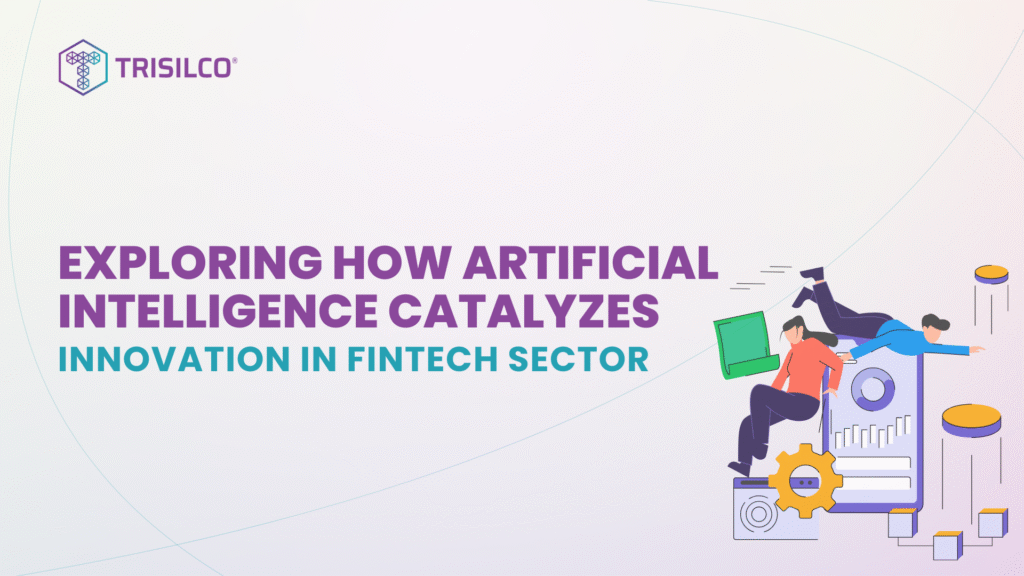Exploring How Artificial Intelligence (AI) Catalyzes Innovation in the Fintech Sector

Artificial Intelligence plays a significant role in Fintech (financial technology) by offering innovative solutions to various challenges and enhancing the efficiency of financial processes. Here are several ways AI helps Fintech.
AI algorithms can analyze vast amounts of data to identify patterns and anomalies that indicate potential risks. This includes credit risk assessment, fraud detection, and anti-money laundering (AML) compliance.
It further enables Fintech companies to provide personalized recommendations and services based on individual customer data, behavior, and preferences. This can include personalized investment advice, tailored insurance plans, or customized budgeting tools.
Benefits of AI in Analyzing Market Data
AI-powered algorithms can analyze market data in real-time and execute trades at high speeds, enabling more accurate predictions and better trading strategies.
Fintech companies use AI-powered chatbots and virtual assistants to provide customer support, answer queries, and assist with transactions. These AI systems can handle routine tasks, freeing up human agents to focus on more complex issues.
The algorithms of AI can assess creditworthiness more accurately by analyzing a wide range of data points beyond traditional credit scores, such as social media activity, transaction history, and employment data.
Furthermore, AI systems can detect fraudulent activities in real-time by analyzing transaction data, identifying unusual patterns, and flagging suspicious behavior for further investigation.
AI-powered tools can help individuals and businesses with financial planning by analyzing their income, expenses, and goals to provide recommendations for saving, investing, and budgeting.
It also can streamline compliance processes by automatically monitoring transactions for compliance with regulations and generating reports required by regulatory authorities.
AI enables Fintech companies to forecast market trends, customer behavior, and financial risks more accurately, helping them make informed decisions and mitigate potential losses. It can also identify patterns of fraudulent behavior and prevent unauthorized transactions, helping Fintech companies protect their customers and maintain trust in their services.
Overall, AI enhances Fintech by improving decision-making, increasing efficiency, reducing costs, and providing better customer experiences.
How Artificial Intelligence is Revolutionizing the Financial Technology Industry
Applying AI in the Fintech industry can bring numerous benefits, from enhancing customer experience to improving risk management and fraud detection. Here are some best practices for leveraging AI effectively in Fintech:
Ensure high-quality data is collected and maintained. Establish robust data governance frameworks to maintain data integrity, security, and privacy compliance. Utilize AI algorithms to personalize user experiences, such as recommending financial products tailored to individual needs based on their transaction history, spending patterns, and life events.
Machine learning can help in segmenting customers more effectively, allowing for targeted marketing campaigns that improve customer engagement and satisfaction.
Regulatory compliance. AI can automate the collection of data from various sources, including transaction records, customer profiles, and financial statements. This reduces the manual effort involved and minimizes the risk of human error.
It also can analyze vast amounts of datasets to identify patterns and trends that are relevant to regulatory requirements. This includes identifying unusual transactions that might indicate fraudulent activity or compliance breaches.
This process for example can enhance Anti-Money Laundering (AML) and Know Your Customer (KYC) processes through more efficient data analysis and anomaly detection.
Adaptability to regulatory changes. AI can be trained through a process that involves feeding data into a computer algorithm to create predictions and evaluate their accuracy, allowing it to adapt to changes in regulatory requirements.
So, when new regulations are introduced, the model can be updated to ensure compliance without extensive human involvement and reconfiguration.
Customer support. AI-driven chatbots and virtual assistants can provide instant customer support, answer queries, and assist with account management tasks. These bots can handle routine inquiries, freeing up human agents for more complex issues.
It also can analyze customer feedback to gauge sentiment which might indirectly improve customer experience and service delivery.
By following these best practices, Fintech companies can harness the power of AI to drive innovation, improve efficiency, and deliver greater value to customers while mitigating risks and maintaining regulatory compliance.
The Advantages of AI in Summary
In conclusion, the integration of AI technologies into the Fintech industry holds immense promise for revolutionizing financial services, enhancing customer experiences, and optimizing business operations.
Fintech companies can unlock new opportunities for growth and innovation, from ensuring data quality and governance, to fraud detection, and risk management. AI-powered solutions offer unprecedented insights and capabilities that can drive strategic decision-making and improve overall performance.
However, it is also crucial to approach AI deployment with ethical considerations in mind, ensuring transparency, fairness, and accountability throughout the process.
By embracing these principles and continuously refining AI models based on feedback and learning, Fintech firms can position themselves at the forefront of industry transformation, delivering value to customers while navigating regulatory complexities and ethical challenges effectively.
Ready to revolutionize your financial services? Contact us at marketing@trisilco.com today to learn how our solutions can drive growth and innovation in your business.